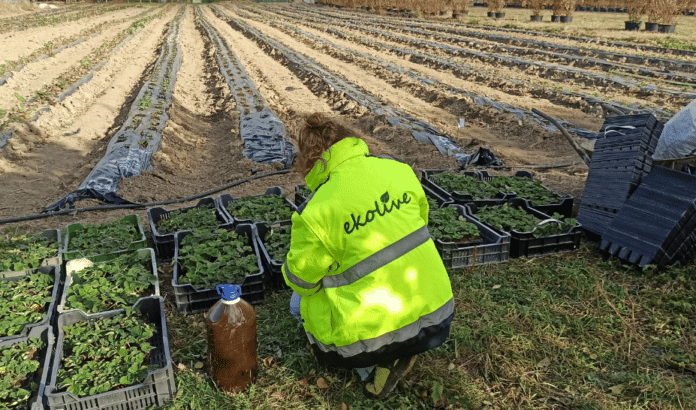Innovative startups are uniquely positioned to push boundaries in the way we produce, manufacture, trade, and consume food.
As the world’s largest and most dynamic food innovation community, EIT Food supports ambitious startups in building a future-fit food system that produces healthy and sustainable food for all.
But with startups often working to develop solutions at a micro level, how do we ensure that they are making a significant impact toward transforming the whole food system?
The answer: focusing on three key areas which benefit people and the planet. EIT Food focuses its work through the lens of achieving Healthier Lives Through Food, creating a Net Zero Food System, and Reducing Risk for a Fair and Resilient Food System.
Many businesses that have received coaching, mentorship, networking, and funding opportunities through EIT Food are already achieving success across one, or even several, of these three key areas.
Read on to learn about successful innovations from ten startups that are already seeing market success, while demonstrating real impact on the food system.
Creating a Net Zero Food System
With our food system responsible for almost a third of greenhouse gas emissions, it is clear a system-wide transformation is needed. We have the potential to create a more sustainable food system: one that mitigates climate change, reduces food loss and waste and unlocks new markets and economic possibilities.
In order to achieve this, innovators are looking at opportunities across every stage of the food value chain, investigating how processes can be made more sustainable.
Ekolive is a startup looking at the very origin of the food chain – soil – in a revolutionary way. Soil health is critical for the resilience of our food systems, however, 61% of EU soils are currently in a degraded state. Ekolive has innovated the solution; a groundbreaking eco-bioleaching technology that replicates the natural process of soil formation – which naturally takes centuries – in just a few days.
This process works by stimulating plants using billions of trained probiotics and plant growth-promoting bacteria that regenerate the soil microbiome. Ekolive’s innovation offers an ecological solution that secures harvest and yields at a low cost. This allows not only for healthy and strong soils to be produced, but the soil also has enhanced capabilities to promote immunity against disease, increase sugar and nutrient content and make crops more resistant to climatic stressors.
Another example is GeoPard Tech, supporting farmers to both produce food more sustainably and manage their land in ways which protect the local environment. The German startup has created a cloud-based analytics platform to help users make the most of opportunities around digital farming, agronomy and precision farming.
GeoPard Tech applies big data and geospatial analytics to different agricultural management systems, making production, fertiliser application and soil management more efficient. The startup – which is part of the EIT Food Accelerator Network – is already implementing its technology in the field to great success, and has partnered with several leading agricultural firms including John Deere and Corteva.
A net zero food system cannot be achieved by food producers alone. One way that innovators are challenging food manufacturing is by analysing how ingredients can be used in different ways to create more sustainable alternatives to food products. The Berlin-based startup Bettaf!sh has innovated 100% plant-based fish alternatives – its flagship ‘TU-NAH Can’ looks and tastes just like tuna, but is manufactured using regeneratively farmed European seaweed. Not only have sales from this product spared 134 tonnes of tuna fish and 136 tonnes of bycatch, but the product has generated new, sustainable opportunities for coastal communities in Europe. Bettaf!sh is continuing to expand, offering ten products across central and southern Europe.
The food chain doesn’t end here. If we are to reach net zero, we need creative ideas to tackle the one-third of all food produced globally which is currently wasted. Austrian startup Kern Tec are making our supply chains more circular by upcycling fruit pits destined for landfills into plant-based products.
By looking inside the pit, Kern Tec obtains valuable oils and proteins which are transformed into a base compound for alternative dairy products such as plant-based milk, yoghurt and cheese. This is a fantastic example of using innovation to advance the circular economy and the valorisation of waste – truly a win-win.
It is increasingly important for companies to accurately define and communicate their environmental impact, but this can be a complicated, costly process. To combat this challenge, Finnish startup Biocode has generated an easy-to-use carbon footprint calculator for food production, revolutionising carbon footprinting in the agrifood sector. This equips companies across the food value chain with the information required to make informed, climate-friendly decisions whilst also assisting companies to meet the growing regulations in the EU.

Achieving Healthier Lives Through Food
Consumers are at the beneficiaries of the food system – yet in our current system, healthy food choices are not accessible to all. But the tide is turning, with innovators and entrepreneurs creating ambitious solutions to boost nutrition and health, and empowering consumers with a wider range of healthy, affordable choices.
Last year, for the first time, a 3D-printed food hit the shelves of European supermarkets. This was ‘The Filet’, a plant-based alternative to salmon created by Revo Foods. The Filet is high in amino acids, filled with key vitamins and free from sugar, gluten and cholesterol. In March this year, Revo Foods – which is part of EIT Food’s RisingFoodStars programme – celebrated another world first: the first vegan octopus alternative. Revo Foods products, which also include fish-inspired vegan spreads, are now available across 20 European countries.
Consumers are increasingly demanding affordable plant-based ingredients as plant-forward diets become more popular. Startups across Europe, such as The Very Food Co, are helping to support this dietary shift. The French company has launched into the market the Very Aquafaba: a plant-based alternative to egg whites, which is an essential ingredient in baking and cocktail making.
The Very Aquafaba is allergen-free, shelf-stable and is made with just one ingredient, chickpea water. With a simple but disruptive innovation, Very Food has the opportunity to take Europe by storm with a large potential customer base of food manufacturers, food service companies, bakery and pastry professionals, and bars and hotels.
Today, one in four European children has a food allergy, which threatens the health and wellbeing of millions. However, studies have found that food allergies can be prevented in babies by up to 80% through introducing allergens at an early stage.
Vini Mini is on a mission to support parents and carers in this practice by offering an easy, healthy and safe way to give allergens to a baby. Parents can safely test whether their child is allergic to nuts, and if they aren’t allergic, the Vini Mini offers products to maintain the allergen intake for a further six months.
Reducing Risk for a Fair and Resilient Food System
Currently, our food system is vulnerable to global shocks. This threat has been highlighted in recent years, with a global pandemic and the ongoing conflict between Russia and Ukraine significantly impacting European food supply chains.
With the global population expected to reach ten billion before 2050, now is a critical time to strengthen our food system to increase food security and safety for consumers everywhere. Key to this is increasing transparency and traceability, which can improve the safety, efficiency and sustainability of food.
Based in Barcelona, Microfy.AI is harnessing the latest technology to improve value chain transparency through Honey.AI – the first intelligent microscope to perform honey quality analysis on-site. The technology doesn’t affect the freshness or nutritional value of the honey and provides an affordable solution for honey packers, traders and producers to ensure its quality.
Building on its success, Microfy.AI is now developing a tool that will help boost workers’ livelihoods and support bee populations, by detecting disease in beehives. The company is already developing prototypes for applying the technology to other applications, such as monitoring yeast and fungi growth.
Truffle is an earthy, unique and globally sought-after flavour, but due to challenges in sourcing and the associated price tag, companies often turn to synthetic truffle flavourings. However, their similarity to the real flavours is variable, and consumers can be dissatisfied by manufacturers’ lack of transparency, as well as the final taste.
Swiss startup Nectariss has developed breakthrough technology to produce authentic truffle flavours through fermentation, made with real truffle funghi, and available all year round. Hailed as ‘the most authentic truffle flavours on the market’, the Nectariss MethodTM allows for true value chain transparency. This has been echoed in Nectariss’ popularity; it has grown by 300% in its B2B customer base, expanding from two European countries in 2021 to five – as well as the USA – in 2023.

Within just one year, these ten trailblazing startups are already creating impact and achieving success in the market. From expanding across borders to developing new, innovative products, they are a testament to the opportunity to create a real impact for the agrifood system.
Many overlap across several or all of the three impact areas, having broad and far-reaching impacts on the whole food system. EIT Food not only supports these startups but connects them with actors working across the food system, including corporates, researchers, educators and consumers. By supporting their journeys in the months and years to come, we’ll no doubt continue to shape the food system of the future.




